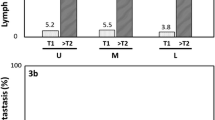Abstract
A total of 587 cases with gastric cancer was reviewed. Particular emphasis was placed on the comparative studies on the stages of stomach cancer and end-results of the R2 (with a conventional lymph node dissection) and the R3-resections (with an extended lymph node dissection). R3-resections were found to be generally associated with higher 5-year survival rates than R2-resections. Especially for the positive lymph node cases not having a marked serosal invasion, the 5-year survival rate was considerably higher with R3-resections than with R2-resections (55.3 percent versus 21.5 percent). Although the differences were not significant statistically, it has been suggested from these results that the end-results might be improved more effectively by performing R3 resection for cases without a marked serosal invasion.
Similar content being viewed by others
References
Arhelger, S. W., Lober, P. H. and Wangensteen, O. H.: Dissection of the hepatic pedicle and retropancreaticoduodenal areas for cancer of the stomach, Surgery 38: 675–678, 1955.
Berry, R. E. L. and Rottschafer, W.: The lymphatic spread of cancer of the stomach observed in operative specimen removed by radical surgery including total pancreatectomy, Surg. Gynec. Obstet. 104: 269–279, 1957.
Fischer, E. R. and Hoerr, S. O.: The practical value of histopathological classification of gastric carcinoma; an appraisial based on 100 consective cases, Cancer 8: 389–395, 1955.
Gilbertsen, V. A.: Results of treatment for more extensive surgery and a report of 1983 cases, Cancer 23: 1305–1308, 1969.
Handa, K.: The clinicopathological study of lymph-node metastasis in the gastric cancer subjected to the extended radical operation, J. Kyoto Pref. Univ. Med. 78: 41–55, 1969.
Hara, T.: The long term results of carcinoma of the stomach treated by gastrectomy, particularly the significance of the role of extended lymphnodes dissection, J. Kyoto Pref. Univ. Med. 78: 249–261, 1969.
Jinnai, D. and Tanaka, S.: Technique of exterded radical operation for gastric cancer, Geka Chiryo (Surgical Therapy) 7: 316–324, 1962 (in Japanese).
Japanese Society for Gastric Cancer Research: The general rules for the gastric cancer study in surgery and pathology, 6th edition, Kanehara Shoten, Tokyo, 1968 (in Japanese).
Jinnai, D.: Evaluation of extended radical operation for gastric cancer, with regard to lymph nodes metastasis and follow-up results, Gann Monograph Japanese Cancer Institute, Tokyo, 3: 225–231, 1968.
Kajitani, T.: The method of complete dissection of the lymph nodes and channels in carcinoma of the stomach, Nihon Geka Gakkai Zasshi (in Jap. Surg. Soc.) 54: 464–465, 1953 (in Japanese).
Koga, S., Makihara, S. and Yamanouchi, Y.: Lymphnodes dissection in operation of gastric cancer and its follow-up result, Gan no Rinsho (Jap. J. Cancer Clinics) 16: 316–320, 1970 (in Japanese).
Majima, S., Harada, M., Etani, S., Yasukawa, M., Takahashi, T., Hara, T., Handa, K., Komai, S. and Higuchi, H.: Indication and curability of the extended radical operation for gastric cancer, Nihon Gan Chiryo Gakkaishi (J. Jap. Soc. Cancer Th.) 4: 536–546, 1969 (in Japanese).
Majima, S.: A critical evaluation of superradical gastrectomy (R3) for cure of carcinoma of the stomach, Gan no Rinsho (Jap. J. Cancer Clinics) 16: 340–345, 1970 (in Japanese).
Maruta, K. and Shida, H.: Some factors which influence prognosis after surgery for advanced gastric cancer, Ann. Surg. 167: 313–318, 1968.
McNeer, G., Lawrence, W., Ashley, M. P. and Pack, G. T.: End results in the treatment of gastric cancer, Surgery 43: 879–896, 1958.
Mine, M., Majima, S., Harada, M. and Etani, S.: End-results of gastrectomy for gastric cancer, with special reference to the effect of extensive lymph nodes dissection, Surgery 68: 753–758, 1970.
Muto, M., Majima, S., Yoshida, K., Karube, K. and Teshima, T.: Factors influencing the end-results of gastrectomy for stomach cancer, Tohoku J. Exper. Med. 87: 279–296, 1963.
Okajima, K., Fuji, Y., Nakagawa, J., Endo, T. and Takeshita, A.: On the grade of curative resection for the gastric cancer and on the other factors in relation to the prognosis, Gan no Rinsho (Jap. J. Cancer Clinics) 16: 327–339, 1970 (in Japanese).
Sato, H. and Nakano, K.: Evaluation of long year survivals based on methods of surgical operations (R) for the treatment of gastric cancer, Gan no Rinsho (Japan J. Cancer Clinics) 16: 321–326, 1970 (in Japanese).
Sunderland, O. A., Mc Neer, G., Ortega, L. G. and Pearce, L. S.: The lymphatic spread of gastric cancer, Cancer 6: 987–996, 1953.
Author information
Authors and Affiliations
Rights and permissions
About this article
Cite this article
Majima, S., Etani, S., Fujita, Y. et al. Evaluation of extended lymph node dissection for gastric cancer. The Japanese Journal of Surgery 2, 1–6 (1972). https://doi.org/10.1007/BF02468900
Received:
Issue Date:
DOI: https://doi.org/10.1007/BF02468900




